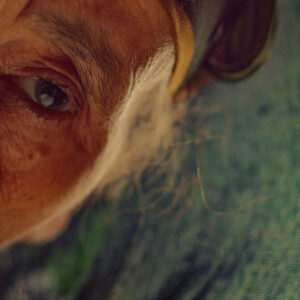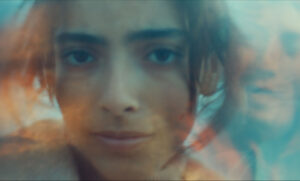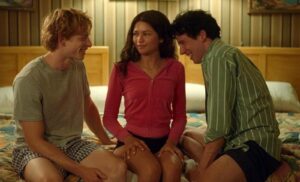The young Godus brothers represent one of the symbols of the success of the emerging national cinema in Saudi Arabia. Faris is a director and screenwriter while Sohayb is an actor, screenwriter and producer. Their first feature film, The Book of Sun (2020), which tells of the flourishing of cinema in the country, has been a great commercial success. Between them, they share an extensive career in short films and TV series.
TFV ME met Faris and Sohayb Godus at the last Cannes Film Festival inside the sea facing Saudi pavilion.
Can you each tell me something about your your career in cinema? Why did you decide to become filmmakers?
Faris: We come from a family of storytellers. My father is a short story writer, even my grandfather. The grandfather of my grandfather is a poet. So it runs in the family. But the interest in cinema has started with us, growing up watching Hollywood films. So our interest in Hollywood and in their commercial cinema is the basis in the passion of becoming a filmmaker.
Sohayb: And honestly, at that time basically there weren’t any places where you could make movies. So we started doing shorts for our families, very small films. And then, after that, we tried applying to some competition for commercials. After that, when YouTube or when the digital era started in 2010, it gave us a stage where we could express ourselves. We did shorts, web series. In Saudi there’s more than 30 million people, so they’re interested to watch Saudi content as well. At around the same time there was a revolution of digital cameras to shoot videos. Before that, film cameras were very expensive. This allowed to shoot video and that for us was a revolution because you have this access to quality, which is very cheap. Doing films was a blessing and, by the time we finished our film, streaming platforms were everywhere. So our first film is now distributed to 140 countries. We caught on at a good time.
In Arab countries, poetry is a traditional form of art. Do you think that cinema could represent for you a new and a modern kind of poetry?
Faris: Even the Ministry of Culture basically handles a lot of aspects in the cultural form of art. For example, we have the theatrical art, literature and poetry and also we have cinema now. Today especially, I mean for the Saudi films, it is like telling a cultural story. Also for people from outside Saudi Arabia: if you want to know about Saudis, if you watched five particular films, you can get the sense of us. In that sense cinema is perfect because it goes beyond words. Acting is human interaction. So I might be saying something in a film, thinking consciously about something, but you, as an Italian, from another country, you might see something else. And that’s the beauty of poetry and cinema.
Sohayb: Honestly, even when we watch Korean movies, Italian movies, French movies, just for us, it gives us an insight about how each of those people think, how they live together. It gives us the taste of your everyday life.
Can you tell me something about your films? Which kind of cinema do you prefer to make?
Sohayb: We basically started the first feature film we presented back in 2019. It is called The Book of Sun, which talks about the content creation in Saudi Arabia. It started with this kid who is in school, who wanted to make a feature film with very minimal capabilities. He’s a student so he collaborated with other students and his teacher and they end up creating a film, at a time where there was no cinema. We, the audience, see them struggling in creating this horrible movie, but we show the passion, and this is what people love, that we see their friendship and then we see their struggle. We want them to succeed, but ultimately they can’t.
Faris: It gives you a sense that even if you make a bad film, you can have a big passion. We were thinking of doing that film. Should we have them make a good film or make a film about them? And we said if they do have a bad film that they are still happy about, we can show what it’s like to make a film.
Sohayb: And this is the beauty of filmmaking. The Book of Sun was a hit, it went viral on Netflix. It’s still on Netflix, by the way, worldwide. It did really well even theatrically, even during the COVID-19 epidemic and lockdowns.
Faris: I would like to talk about the feature film we’re working on, our second feature. The title is translated literally into Midnight and Midday Nightmares. In Arabic it has a different meaning because there is no word for the concept that, basically, if you sleep during the day, you have a weird dream. The dreams are different than the dreams in the night. I’ve read that through history, in lots of cultures, but only in Arabic it lacks a term. And we feel like that’s the time we’re living now, in a global world. With globalization, all cultures are now merging together. The world is a small town, especially with technologies. And we talk about that. We can see it in social media. We tell it through the story of a father and his daughter. They live in the same house, but mentally they’re in different worlds. How they come together through social media is a journey. It’s funny. It’s dark. We target global audiences because we think it’s relatable even though the story takes place in Saudi. We think that it’s something people can experience all around the world.
Sohayb: I think social media basically is changing and not only Saudi.
In the history of cinema, are there directors you love or by whom you are inspired?
Faris: To me, I love Edgar Reitz. I really love the style. I love all of his taste, his choice, I really relate to it. Also Wes Anderson. He’s a painter.
Sohayb: I want to say something Italian for you. I’m very influenced by Cinema Paradiso. And maybe by Stanley Kubrick and Martin Scorsese. In the feature film we are working on, you might see a Scorsese influence, because we grew up watching his films. We love the storytelling. We love how it always has moral roots. And Francis Ford Coppola too, by the way.
You know films from different countries. Can we say that cinema could represent a bridge between different cultures?
Sohayb: When I watch an Italian film, like Cinema Paradiso, I see some resemblance with the culture of Egypt. In Arab countries we call Italians the “Arabs of Europe”. We see a lot of family values that are very similar. And also for their relationship with food.
Faris, you are a director and screenwriter, and Sohayb, you are an actor, screenwriter and producer. How do you work together? How do you start a new project?
Sohayb: We always fight and then we achieve.
Faris: Honestly every film has been different. Every film has been a different situation. Every film has been a different experience so we write each project differently. The general idea is that we work on the same script. The way we do it is like we agree on the story, we write the first 20 pages together but then we take different aspects of the story. Even though we are brothers, we have very different approaches. What’s the conflict of us? Making these stories coming together is what’s interesting. We have different point of views and the way they interact is what’s interesting.
Sohayb: I think from my perspective, it’s about understanding. Faris the director? Is he now the creative head? Is he now talking to me as a brother? Whenever I can differentiate between all of these positions, because we are brothers, I think this is what makes it interesting. And with each project it has its own obstacles and new obstacles. We always change the formula. It’s not professional, but it works.
Which is the goal you want to achieve with cinema? Do you ultimately want to speak about your society?
Faris: It depends on what’s happening. We don’t do films as filmmakers. We do films as people and what we see in our lives is basically reflected on paper [and on the big screen]. That’s our approach.
Sohayb: Honestly, for example there are certain worlds that are so hard to portray. However, it’s so easy to have it within a film. And this is the beauty of films and I think by this time we’re living in a golden era in Saudi Arabia, for the support and all of these things. And I think this is a responsibility. And this is for us, as filmmakers having all of these opportunities, our responsibility, to handle this precious values that we have

.png)




Really good information can be found on website.Expand blog